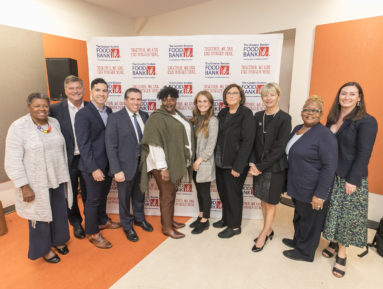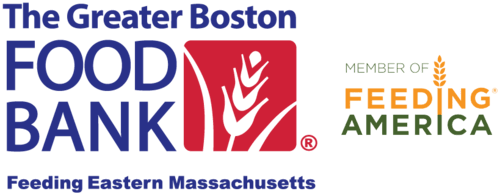GBFB Reflects on Historic White House Conference on Hunger, Nutrition and Health with Panel Discussion of Local Leaders
FOR IMMEDIATE RELEASE
The Greater Boston Food Bank Reflects on Historic
White House Conference on Hunger, Nutrition and Health with Panel Discussion of Local Leaders
Mass. Secretary of Health & Human Services Marylou Sudders, State Senator Sal DiDomenico, State Representative Andres Vargas, Stop & Shop President Gordon Reid, Roxbury Community College Leaders along with Instacart joined GBFB President & CEO Catherine D’Amato for event on September 29
BOSTON – (September 30, 2022) – In follow up to the historic White House Conference on Hunger, Nutrition and Health, The Greater Boston Food Bank (GBFB), the largest hunger-relief organization in New England, hosted a panel discussion with local leaders to discuss the National Strategy announced out of the conference. The public event, sponsored by Instacart, featured local leaders including Mass. Secretary of Health and Human Services Marylou Sudders, State Senator Sal DiDomenico, State Representative Andres Vargas, Stop & Shop President Gordon Reid, client advocate Donnette McManus, Roxbury Community College Interim President Dr. Jackie Jenkins-Scott, RCC’s Director of Project Access Lisa Carter, and GBFB President and CEO Catherine D’Amato.
 The event, held September 29 at Roxbury Community College, provided those working to end hunger with a forum to review the key takeaways from the conference and discuss how those recommendations can be implemented here in the Commonwealth to aid the 1 in 3 residents who report experiencing food insecurity in the past year.
The event, held September 29 at Roxbury Community College, provided those working to end hunger with a forum to review the key takeaways from the conference and discuss how those recommendations can be implemented here in the Commonwealth to aid the 1 in 3 residents who report experiencing food insecurity in the past year.
The underpinning theme and goal of the conference was to elevate the voices of individuals with lived food insecurity experience. In valuing the importance of continued engagement with neighbors most directly impacted, Donnette McManus, a client advocate at GBFB’s partner agency Catholic Charities in Brockton, was invited to be one of the leading voices on the panel.
“Food is part of the cycle that fuels everything we do,” said McManus. “The Greater Boston Food Bank, its partners, and the front-line food pantry workers and volunteers give my family the fuel we need to not only consume nutritious foods, but also the desire to serve so that our legacy will be an example of breaking the chain of food insecurities in our community and beyond.”
There were several panelists who travelled to D.C. to attend the historic Conference in person, including State Legislators and GBFB’s President and CEO.
“This was the first White House Conference on hunger to be held since I joined The Greater Boston Food Bank 27 years ago, not to mention the first in 50 years,” said D’Amato. “After all this time, it was deeply rewarding to see the issue of hunger elevated to the national spotlight. We applaud the Biden Administration and the bipartisan coalition that made the conference possible. We look forward to continuing to engage with others in the hunger, nutrition, and health community around the resulting national hunger strategy in support of our mission, to end hunger here.”
“As a longtime advocate of expanding access to nutritious foods, I am honored to join The Greater Boston Food Bank’s event and be a part of this important discussion on food access and nutrition insecurity,” said Senator DiDomenico, Assistant Majority Leader of the Massachusetts Senate. “We have made big strides addressing these issues in Massachusetts but there is still a long way to go until hunger is eliminated and nutritious foods are accessible to all. The White House Conference on Hunger, Nutrition and Health and the federal government’s expanded support are great steps toward addressing food and nutrition insecurity in Massachusetts and across the United States.”
“Hunger is a solvable problem. The barriers between families and nutritious food are not inevitable. From closing the SNAP gap to ending food deserts, challenges to food security can be addressed through innovation and collaboration from both the public and private sectors,” said Rep. Vargas. “The White House’s Conference on Hunger, Nutrition and Health is a testament to the Biden Administration’s commitment to ensuring everyone has access to nutritious food; I was honored to attend and to continue our work at home in Massachusetts to ensure no person goes hungry in the Commonwealth. Thank you to Greater Boston Food Bank for putting this event together and for their round-the-clock dedication to feeding families in our state.”
It was important to include both policymakers and policy implementers in the conversation, and among the most influential policy implementers is the head of Massachusetts Health and Human Services Agency.
“The pandemic exacerbated food insecurity across the Commonwealth and nation, and innovative collaboration at every level of government is more important than ever before,” said Secretary Sudders. “The White House Conference yesterday affirmed what we already knew to be true – reducing hunger is not enough, we must also work to address the underlying systems and structures that lead to food insecurity. Through initiatives including the Universal Free Lunch Program, the Healthy Incentives Program, the Food Security Infrastructure Grant Program, and the recently approved MassHealth 1115 Waiver, Massachusetts continues to be a leader in providing innovative solutions to hunger and food insecurity.”
The power of collaboration was a theme during the conversation, and it was repeatedly stated that government cannot do it all – they will need bi-partisan and private partnerships to achieve their goals. One of the largest sectors impacting the food system and supporting anti-hunger efforts is the retail sector and GBFB Board and Food Industry Council member and Stop & Shop CEO Gordon Reid offered that perspective.
“There’s powerful potential in public-private partnerships in the fight against hunger – and as a grocery retailer, we also believe in leveraging our strong relationships with supplier partners in this effort,” said Gordon Reid. “Working to combat student hunger in particular is a pressing priority that we’re working to address through our Stop & Shop School Food Pantry Program. We are supporting more than 140 in-school pantries across the Northeast thus far and hope to leverage the momentum coming out of the White House Conference to propel the program’s growth even further.”
“Expanding access to nutritious food has always been at the core of Instacart’s mission. As a company at the center of people’s relationship with food, we have an opportunity—and responsibility—to deliver the ingredients for healthier living,” says Deputy Policy Manager, Robin Sommer. “Through our new Instacart Health initiative, we look forward to continuing to work closely with leaders like The Greater Boston Food Bank to expand access to nutritious food and improve health outcomes in Massachusetts and across the country.”
It was no coincidence that GBFB held this conversation on a community college campus, as one of the food bank’s lead policy priorities is advancing hunger-free campuses through legislation (S.2811/H.4697) and by co-leading the statewide MA Hunger Free Campus Coalition. Roxbury Community College is a longtime member of this coalition and has been a leader in addressing student hunger and basic needs for years.
“Roxbury Community College is committed to working toward ending hunger on campus and we are grateful for GBFB’s leadership with the Hunger Free Campus Coalition,” said RCC Interim President Jackie Jenkins-Scott. “We’re proud to host today’s panel here on campus. Lifting up the voices of individuals facing food insecurity and amplifying them in the decision-making process is essential to moving policy forward.”
In advance of the conference, D’Amato participated in a national task force, and GBFB attended listening sessions and hosted focus groups to inform GBFB’s policy comments submitted to the White House.
The panel discussion concluded a full slate of Hunger Action Month activities this September, which included the WCVB-TV Channel 5 annual Hunger Action Month Day of Awareness, an all-day, on-air fundraiser; the Annual Red Sox Strike Out Hunger Weekend; the 9/11 Day of Service meal packing event; the September 23rd Hunger Action Day landmark lighting in orange (the symbolic color of hunger); the High Street Place Food Hall “Round-Up” Program fundraiser; and The Helping Menu (ongoing), with local restaurants adding new, creative options to their existing menu that encourage their guests to donate to GBFB.
Those in need of food assistance are encouraged to visit GBFB.org/need food, where they can find a list of resources and search for a food program by zip code.
About The Greater Boston Food Bank
The Greater Boston Food Bank (GBFB) is the largest hunger-relief organization in New England and among the largest food banks in the country. As the food bank for Eastern Massachusetts, GBFB is feeding people in 190 towns across the region, distributing the equivalent of nearly 100 million meals through a network of 600 dedicated food distribution partners and programs. A member of the national Feeding America network, GBFB’s mission is to end hunger here. The organization remains committed to the belief that access to healthy food is a human right regardless of an individual’s circumstances. Through policy, partnerships, and providing free, nutritious, and culturally responsive food, GBFB is committed to addressing the root causes of food insecurity while promoting racial, gender and economic equity in food access. For more information and to help us help others, visit us at GBFB.org, follow us on Facebook, Twitter (@gr8bosfoodbank) and Instagram, or call us at 617.427.5200.
Media Contact
Catherine Lynn
GBFB
VP, Communications and Public Affairs
617.828.7422
press@gbfb.org
